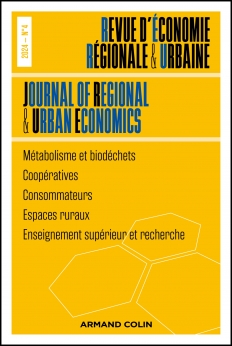
REVUE D'ÉCONOMIE RÉGIONALE ET URBAINE (4/2024)
Pour acheter ce numéro, contactez-nous
Recevez les numéros de l'année en cours et accédez à l'intégralité des articles en ligne.
Depuis le 1er janvier 2024, les collectivités territoriales françaises doivent proposer une solution de collecte et de valorisation des biodéchets ménagers. Cette action vise à recirculariser les flux et reconnecter, à terme, la ville et son espace d’approvisionnement alimentaire. Différents systèmes de gestion des biodéchets ménagers sont comparés sur la Métropole de Lyon (notamment un modèle semi-industriel centralisé local et un modèle de proximité), dont nous analysons les caractéristiques spatiales, les propriétés et modalités de fonctionnement. Même si le système de proximité semble porter davantage de potentiel en matière de socialisation ou d’initiative habitante, il se heurte à des questions de faisabilité en milieu urbain dense qui justifie finalement le recours au système centralisé à une échelle locale. Ces deux modes de gestion nous semblent constituer des opportunités complémentaires plus que concurrentes en fonction des caractéristiques socio spatiales des territoires et de l’objectif du dispositif. Ils présentent deux déclinaisons de régimes métaboliques territoriaux : un régime sectoriel et un régime territorial.
By the end of 2023, in accordance with European legislation, all French local authorities will have to propose a solution for collecting and recycling household bio-waste. Some local authorities, such as the Lyon metropolitan area, have tested various solutions, such as installing compost containers at the foot of buildings and voluntary collection in bins placed in public spaces. These measures put in place aim to recycle the flows of matter and energy. The reuse of such matter was broken from the middle of the 19th century. This “metabolic break” is significant in the case of household waste since the household trash comprising on average 1/3 of organic waste is often incinerated. This research, funded by the French ecological transition agency (ADEME), aims to identify different bio-waste management and recovery channels in the territory of the Lyon metropolitan area. It relies primarily on the production of statistical and cartographic data. It offers an analysis of the metropolitan strategy for managing household bio-waste. The stakeholder analysis is based on interviews with local stakeholders (public, private and users). Interviews with local stakeholders complete the analysis of the different bio-waste management systems and their comparison. They oscillate between a local centralized industrial model and a local model whose spatial characteristics, properties and operating methods are analyzed. Even if the proximity system seems to have more potential in terms of socialization or resident initiative, it comes up against questions of feasibility in dense urban areas which ultimately justifies the use of the centralized system on a local scale. These two management methods seem to constitute complementary rather than competing opportunities depending on the socio-spatial characteristics of the territories and the objective of the system. They present two variations of territorial metabolic regimes: a sectoral regime and a territorial regime.